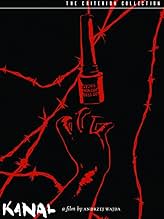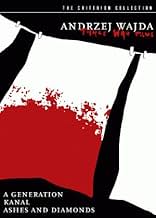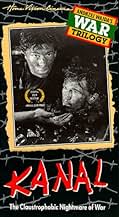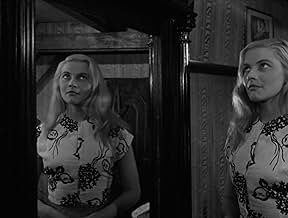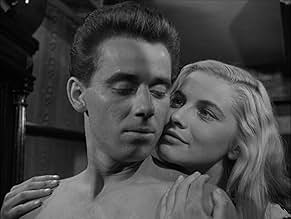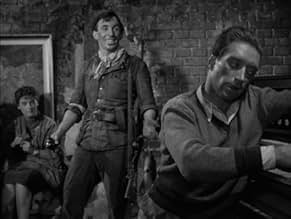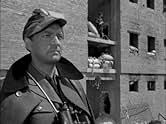AVALIAÇÃO DA IMDb
7,9/10
8,5 mil
SUA AVALIAÇÃO
Em 1944, durante a revolta de Varsóvia contra os nazistas, o tenente polonês Zadra e seus combatentes da resistência usam o sistema de esgoto de Varsóvia para escapar do cerco alemão.Em 1944, durante a revolta de Varsóvia contra os nazistas, o tenente polonês Zadra e seus combatentes da resistência usam o sistema de esgoto de Varsóvia para escapar do cerco alemão.Em 1944, durante a revolta de Varsóvia contra os nazistas, o tenente polonês Zadra e seus combatentes da resistência usam o sistema de esgoto de Varsóvia para escapar do cerco alemão.
- Direção
- Roteirista
- Artistas
- Indicado para 1 prêmio BAFTA
- 1 vitória e 2 indicações no total
Vladek Sheybal
- Composer Michal
- (as Wladyslaw Sheybal)
Wlodzimierz Bednarski
- Insurgent
- (não creditado)
Zenon Dadajewski
- Insurgent
- (não creditado)
Avaliações em destaque
I think everyone who saw this film knows that it's a masterpiece, but maybe not everyone knows how authentic the film is. The writer of the screenplay - Jerzy Stefan Stawinski - is in fact the Lieutenant Zadra responsible for his platoon. Stawinski wrote down his own war experiences here with impressing honesty.
Another thing that may be interesting in this film is the main female character - Daisy. She isn't supposed to be a superwoman as some suggested. In fact there were several thousands of women fighting in this uprising. All of them that survived it were given the status of soldiers by Germans. It was the first time in the world's history when women received such a status. During the uprising many of them were carrying mail via sewers, so Daisy is rather a typical character in this role. It would be more surprising if the guide was a man.
Another thing that may be interesting in this film is the main female character - Daisy. She isn't supposed to be a superwoman as some suggested. In fact there were several thousands of women fighting in this uprising. All of them that survived it were given the status of soldiers by Germans. It was the first time in the world's history when women received such a status. During the uprising many of them were carrying mail via sewers, so Daisy is rather a typical character in this role. It would be more surprising if the guide was a man.
"Kanal" (Polish, 1957): This is the second of Andrzej Wajda's trilogy about WWII in Poland. I love the photography the light, the angles, the flowing camera movements. "Kanal" is about a group of resistance fighters and civilians who, out of necessity, band together to fight (what appears to be a losing battle) against the oncoming Nazis. First set in an incredibly bleak ruin of Warsaw, the story and acting only intensify as they begrudgingly try to escape through the underground sewer system. This one will take it out of you. It is relentless. It is relentless. It is relentless. It is relentless. Relentless. Relentless. Relentless. Relentless. Relentless. Relentless.
Did Andrzej Wajda predict the modern horror film? Or was he merely acting on--and manipulating--our fear of the big, scary monster? There are many shots in KANAL where the camera will simply stay on a passageway seconds after the survivors leave the shot. As a modern audience who has lived through horror films, we expect a Nazi or a monster to slip into the frame in the background, but it never does. KANAL truly is a horror film, but what's unbearable to us and the sturdy group of Resistance fighters isn't the Nazis above the sewers or the metaphorical monster, but it is the solitude and emptiness that drives them to insanity, death or a bitter end.
KANAL is Andrzej Wajda's dirty, bloody valentine to the heroes of the 1944 Warsaw Resistance as the film follows the last hours of a band of heroes in their ultimately futile attempt to escape the Nazis through the labyrinth of underground sewers. We are first introduced to them as strong, willful humans trying to survive in a world that's falling to ruins (One could also argue that Andrzej Wajda also created the first post-apocalypse film). They laugh, they love, they play music in the last happy moments of their lives. After they enter the sewers, we expect and want them to come out even more strong-willed than ever--how many people can face dead bodies floating in the water of a dirty sewer with the same calm defiance? But as time goes on and the group gets separated, it becomes more and more inevitable that these heroes are not meant for a Hollywood's movie's happy, redemptive ending.
Andrzej Wajda, like Roman Polanski, was a real survivor of the Nazi invasion of Poland during WWII, and both became filmmakers who brought their experiences to films, as Polanski did with Oscar-winning THE PIANIST. However, Polanski's film, though absolutely profound, doesn't have Wajda's eye for details--the scenes of ruined Warsaw, for example, seem almost CGI'ed and it's obvious that he's trying to go for more, while Wajda will focus solely on the dirty ground, the debris blowing in the wind, or the flames of a burning building in the background. With Wajda, less is much more effective. If there is a situation more dirty, awful, lonely, scary or haunting than these people making their way through the labyrinths, I have yet to see it.
KANAL is Andrzej Wajda's dirty, bloody valentine to the heroes of the 1944 Warsaw Resistance as the film follows the last hours of a band of heroes in their ultimately futile attempt to escape the Nazis through the labyrinth of underground sewers. We are first introduced to them as strong, willful humans trying to survive in a world that's falling to ruins (One could also argue that Andrzej Wajda also created the first post-apocalypse film). They laugh, they love, they play music in the last happy moments of their lives. After they enter the sewers, we expect and want them to come out even more strong-willed than ever--how many people can face dead bodies floating in the water of a dirty sewer with the same calm defiance? But as time goes on and the group gets separated, it becomes more and more inevitable that these heroes are not meant for a Hollywood's movie's happy, redemptive ending.
Andrzej Wajda, like Roman Polanski, was a real survivor of the Nazi invasion of Poland during WWII, and both became filmmakers who brought their experiences to films, as Polanski did with Oscar-winning THE PIANIST. However, Polanski's film, though absolutely profound, doesn't have Wajda's eye for details--the scenes of ruined Warsaw, for example, seem almost CGI'ed and it's obvious that he's trying to go for more, while Wajda will focus solely on the dirty ground, the debris blowing in the wind, or the flames of a burning building in the background. With Wajda, less is much more effective. If there is a situation more dirty, awful, lonely, scary or haunting than these people making their way through the labyrinths, I have yet to see it.
10tutusaad
I saw this film in a film festival in Dhaka, in early sixties(Now Bangladesh, then East Pakistan). For me as a student, Sattayjit Ray's Apu trilogy was my only exposer to any kind of art film then. Visual realism was a new thing for us in Indian sub continent. Audience were so spellbound that they could smell sewage sitting in the cinema hall. I think like all great directors, Wajda had the cinematographic sense to create that environment where viewers reality could blend with creative fiction. In post war period of late forties and in early fifties like the School of Polish Posters, all creative mediums went through this fatalistic phase. It was grotesque but realistic.
This is certainly NOT a feel-good film, as it deals with the horrors of the Nazis and their crushing of the Warsaw uprising of 1944. After all, there is no way or reason to make this a nice or fun movie to view. It just isn't possible. BUT, we are treated to an intensely realistic and viscerally disturbing film showing the war in all its awfulness. The first portion of the film is set in crumbling buildings and the nobility of the cause is apparent. However, the vast majority of the film is set in the sewers (hence the title "Kanal") and the characters, over time, lose some of their nobility and just ache to survive. The film is intensely claustrophobic and the filth they move about in literally looks like raw sewage--so as the characters fight for life and, in most cases, give up hope, you find yourself being pulled into their world and their terror. A great, though intensely awful film to watch. So, it comes as no surprise that I would not recommend this film to children or people afflicted with claustrophobia.
PS--if the musician seems familiar, it's because Wladyslaw Sheybal (also known as "Vladek Sheybal") is one of the Bond Villains in the movie FROM Russia WITH LOVE.
PS--if the musician seems familiar, it's because Wladyslaw Sheybal (also known as "Vladek Sheybal") is one of the Bond Villains in the movie FROM Russia WITH LOVE.
Você sabia?
- CuriosidadesDirector Andrzej Wajda was himself a fighter in the Polish resistance movement against the Nazis in World War II and several scenes in the film were based on his experiences.
- Erros de gravaçãoWhen Korab is attacking Goliath self-propelled tracked mine, a wire pulling it can be seen.
- Citações
Narrator: These are the tragic heroes: watch them closely in the remaining hours of their lives.
Principais escolhas
Faça login para avaliar e ver a lista de recomendações personalizadas
- How long is Kanal?Fornecido pela Alexa
Detalhes
- Data de lançamento
- País de origem
- Central de atendimento oficial
- Idiomas
- Também conhecido como
- Canal
- Locações de filme
- Empresa de produção
- Consulte mais créditos da empresa na IMDbPro
- Tempo de duração1 hora 31 minutos
- Cor
- Mixagem de som
- Proporção
- 1.37 : 1
Contribua para esta página
Sugerir uma alteração ou adicionar conteúdo ausente


